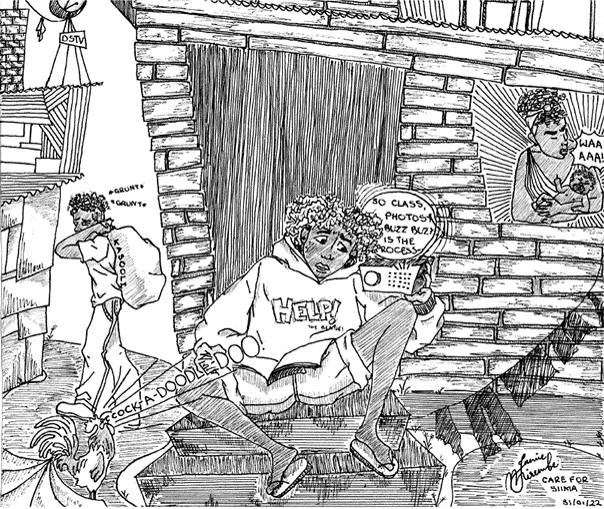Thousands of school-going children in my country deem online education a luxury. So, rather than produce yet another paper covering that, allow me to highlight the impact this pandemic has had on the education systems of lesser-developed nations in the world…
The first golden rays of sunshine have barely snuck across eleven-year-old Siima’s little village. That notwithstanding, she’s already up and tiptoeing around the one-bedroom roadside abode she shares with her family in preparation for her government-issued remote learning. Having successfully rummaged for her tattered notebook and a pencil stub she snagged from the schoolhouse without waking her baby brother, she makes her way onto the makeshift front porch awaiting the day’s lessons. She hasn’t the privilege of logging onto a Zoom or Microsoft Teams meeting. Nor do her parents have the financial means to purchase a smartphone or laptop, let alone maintain a steady Wi-Fi connection. So, she turns the knob on her father’s handheld radio to Tembo FM in preparation for her first lesson of the day.
“Cock-a-doodle-doo!”, came the raspy call of the neighbor’s rooster, denoting the start of school. Unfortunately, the rooster’s crow woke the baby up with a start, and the resultant chaos meant Siima had to press her ear up against the radio speaker to make out what the teacher was going on about. Photosynthesis, was it? Or maybe the Pythagorean theorem? She couldn’t tell.
Brow furrowed from the frustration of another foiled morning lesson, she scarcely noticed her older brother struggling to balance a sack of maize on his back. Barely fifteen, he’d dropped out of high school to trade in the marketplace because their father’s salary was docked in COVID cutbacks. By the time Siima had divided the maize into two bags for him to carry in either hand rather than on his back, she’d missed the majority of the science lesson she had started when the baby was bawling. It was on photosynthesis after all. Yet another concept she’ll never aptly comprehend due to an ineffective approach to remote learning.
Sadly, Siima’s tale is not an anomaly. She and her brother are a minuscule representation of thousands of children in Uganda and millions more in underprivileged nations across the globe who’ve been subjected to the impacts of lackluster education in these trying times. While developing snazzy new adaptations for online education is necessary, I reckon our leaders ought to be more innovative in terms of how they cater to the needs of humbler communities. They can issue leaflets containing subject-specific notes to accompany lesson broadcasts to start. Or set up community centers to host interactive sessions like science experiments and presentations. We can accomplish all this and more if our leaders prioritize education as fervently as they do infrastructure and legislation.
Sloppy education makes for an even sloppier generation. The sooner we grasp this concept, the easier it will be to better the quality of education schoolchildren like Siima have access to. Both during and after the pandemic.
Related:
Announcing winners of the fourth World Bank Group and Financial Times youth blog competition



Join the Conversation